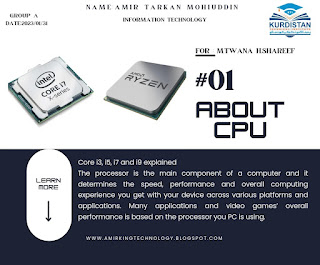Introduction to CPU types
In Types of CPU, CPU is expanded as a central processing unit which is the main and central processor in the electronic circuitry located inside the system. It executes commands according to the computer program. It performs fundamental arithmetic logic, input and output operations, control circuits that follow the program fed in the computer. The term CPU is known as a processor which comprises of the control unit and process unit differentiating the core elements of a computer apart from the external devices like I/O circuitry and main memory. The trending CPU is now available in the form of microprocessors which comprises unit metal-dioxide-semiconductor in the integrated circuits. An integrated chip comprises CPU along with peripheral interfaces, memory chips, microcontrollers, and other systems on the chip. Few systems employ multiple core processor enclosed in a single socket termed as CPU cores.
Types of CPU
The CPU is a vital element that manages all the calculations and commands which are transferred to other components of the computer and its peripherals. The rapid speed of CPU obeys to command of the input program. The components are dependent and powerful when linked to the CPU. So it is necessary to choose the right one and program it accordingly. The leading manufacturers of CPU are AMD and Intel. In the past, the processors are employed to find the right and robust processor.
1. Single-core CPU
It is the oldest type of CPU which is available and employed in most of the personal and official computers. The single-core CPU can execute only one command at a time and its not efficient in multi-tasking. It signifies that there is a markable declination in performance if more than a single application is executed. If one operation is started, the second process should wait until the first one is finished. But if it is fed with multiple operations, the performance of the computer is drastically reduced. The performance of a single-core CPU is based on its clock speed by measuring its power.
. Dual-core CPU
It is a single CPU that comprises of two strong cores and functions like dual CPU acting like one. Unlike the CPU with a single core, the processor must switch back and forth within a variable array of data streams and if or more thread is executed, the dual-core CPU manages the multitasking effectively. To utilize the dual-core CPU effectively, the running programs and operating system should have a unique code called simultaneous multi-threading technology embedded in it. Dual-core CPU is rapid than a single core but it is not robust as quad-core CPU
3. Quad-core CPU
The quad-core CPU is a refined model of multiple core CPU features and design with four cores on a single CPU. Similar to dual-core CPU, that divides the workload in between the cores, and quad-core enables for effective multitasking. It doesn’t signify any single operation which is four times faster rapid than others. Unless the applications and program executed on it by SMT code will fasten the speed and becomes unnoticeable. Such types of CPU are used in people who need to execute multiple different programs at the same time as gamers, series of supreme commander that is optimized in multiple core CPU.
4. Hexa Core processors
It is another multiple core processor which is available with six cores and can execute the task which works rapidly than the quad-core and dual-core processors. For users of the personal computer, the processors of Hexacore is simple and now the Intel is launched with Inter core i7 in 2010 with Hexa core processor. But here the users of smartphones use only quad-core and dual-core processors. Nowadays, smartphones are available with hexacore processors.
5. Octa-core processors
The dual-core is built with two cores, four cores are built-in quad-core, Hexa comes with six cores where the octa processors are developed with eight independent cores to execute an effective task that is efficient and even acts rapidly than quad-core processors. Trending octa-core processors comprises of a dual set of quad-core processors that divides different activities between the various types. Many times, the minimum powered core sets are employed to produce advanced tasks. If there is any emergency or requirement, the rapid four sets of cores will be kicked in. In precise, the octa-core is perfectly defined with dual-code core and adjust it accordingly to give the effective performance.
6. Deca-core processor
The processor with double core comprises two cores, 4 cores are available with quad cores, six cores are available in hexacore processors. Deca-core is available with ten independent systems that are deployed to execute and manage the task that is successful than other processors that are developed until now. Owning a PC, or any device made with a deca-core processor is the best option. It is faster than other processors and very successful in multi-tasking. Deca-core processors are trending with its advanced features. Most of the smartphones are now available with Deca core processors with low-cost and never become outdated. Surely, most gadgets in the market are updated with new processors to give more useful purposes to people.
Mainstream processors of CPU
The mid-range processors are called mainstream processors which is comparatively larger and manages high-performance tasks like video editing, 3D gaming, and other multimedia oriented applications. It is similar to budget-friendly processors that are implemented to execute the fundamental task in a cost-effective method. Such a CPU can be easily managed to operate office programs, photo editing, web browsing, and other basic tasks.
Recommended Articles
This is a guide to Types of CPU. Here we discuss an introduction to CPU Types, six processors with explanation, and midstream processors. You can also go through our other related articles to learn more –







Comments
Post a Comment
I like any one commed and see my post in the website